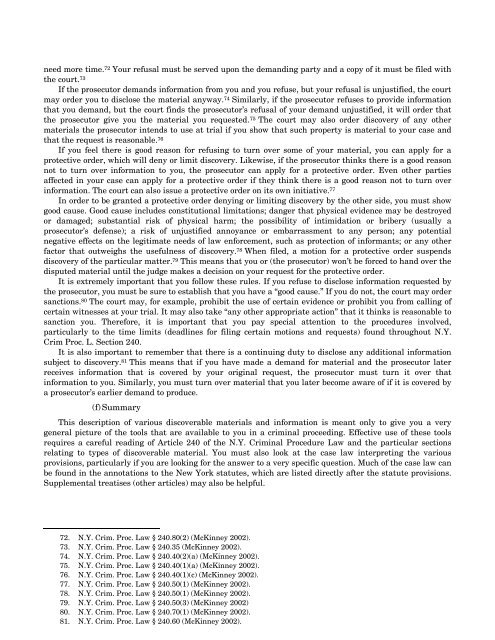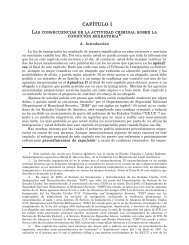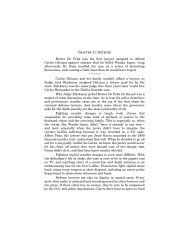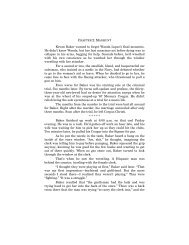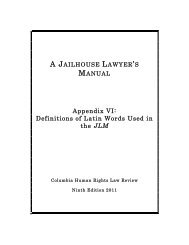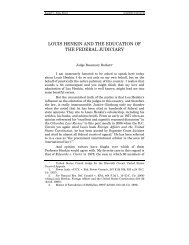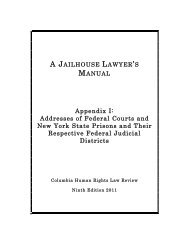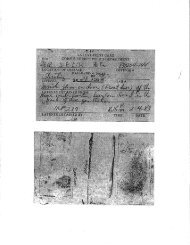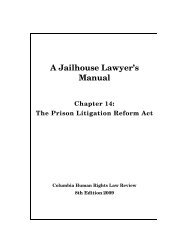A Jailhouse Lawyer's Manual - Columbia Law School
A Jailhouse Lawyer's Manual - Columbia Law School
A Jailhouse Lawyer's Manual - Columbia Law School
You also want an ePaper? Increase the reach of your titles
YUMPU automatically turns print PDFs into web optimized ePapers that Google loves.
need more time. 72 Your refusal must be served upon the demanding party and a copy of it must be filed with<br />
the court. 73<br />
If the prosecutor demands information from you and you refuse, but your refusal is unjustified, the court<br />
may order you to disclose the material anyway. 74 Similarly, if the prosecutor refuses to provide information<br />
that you demand, but the court finds the prosecutor’s refusal of your demand unjustified, it will order that<br />
the prosecutor give you the material you requested. 75 The court may also order discovery of any other<br />
materials the prosecutor intends to use at trial if you show that such property is material to your case and<br />
that the request is reasonable. 76<br />
If you feel there is good reason for refusing to turn over some of your material, you can apply for a<br />
protective order, which will deny or limit discovery. Likewise, if the prosecutor thinks there is a good reason<br />
not to turn over information to you, the prosecutor can apply for a protective order. Even other parties<br />
affected in your case can apply for a protective order if they think there is a good reason not to turn over<br />
information. The court can also issue a protective order on its own initiative. 77<br />
In order to be granted a protective order denying or limiting discovery by the other side, you must show<br />
good cause. Good cause includes constitutional limitations; danger that physical evidence may be destroyed<br />
or damaged; substantial risk of physical harm; the possibility of intimidation or bribery (usually a<br />
prosecutor’s defense); a risk of unjustified annoyance or embarrassment to any person; any potential<br />
negative effects on the legitimate needs of law enforcement, such as protection of informants; or any other<br />
factor that outweighs the usefulness of discovery. 78 When filed, a motion for a protective order suspends<br />
discovery of the particular matter. 79 This means that you or (the prosecutor) won’t be forced to hand over the<br />
disputed material until the judge makes a decision on your request for the protective order.<br />
It is extremely important that you follow these rules. If you refuse to disclose information requested by<br />
the prosecutor, you must be sure to establish that you have a “good cause.” If you do not, the court may order<br />
sanctions. 80 The court may, for example, prohibit the use of certain evidence or prohibit you from calling of<br />
certain witnesses at your trial. It may also take “any other appropriate action” that it thinks is reasonable to<br />
sanction you. Therefore, it is important that you pay special attention to the procedures involved,<br />
particularly to the time limits (deadlines for filing certain motions and requests) found throughout N.Y.<br />
Crim Proc. L. Section 240.<br />
It is also important to remember that there is a continuing duty to disclose any additional information<br />
subject to discovery. 81 This means that if you have made a demand for material and the prosecutor later<br />
receives information that is covered by your original request, the prosecutor must turn it over that<br />
information to you. Similarly, you must turn over material that you later become aware of if it is covered by<br />
a prosecutor’s earlier demand to produce.<br />
(f) Summary<br />
This description of various discoverable materials and information is meant only to give you a very<br />
general picture of the tools that are available to you in a criminal proceeding. Effective use of these tools<br />
requires a careful reading of Article 240 of the N.Y. Criminal Procedure <strong>Law</strong> and the particular sections<br />
relating to types of discoverable material. You must also look at the case law interpreting the various<br />
provisions, particularly if you are looking for the answer to a very specific question. Much of the case law can<br />
be found in the annotations to the New York statutes, which are listed directly after the statute provisions.<br />
Supplemental treatises (other articles) may also be helpful.<br />
72. N.Y. Crim. Proc. <strong>Law</strong> § 240.80(2) (McKinney 2002).<br />
73. N.Y. Crim. Proc. <strong>Law</strong> § 240.35 (McKinney 2002).<br />
74. N.Y. Crim. Proc. <strong>Law</strong> § 240.40(2)(a) (McKinney 2002).<br />
75. N.Y. Crim. Proc. <strong>Law</strong> § 240.40(1)(a) (McKinney 2002).<br />
76. N.Y. Crim. Proc. <strong>Law</strong> § 240.40(1)(c) (McKinney 2002).<br />
77. N.Y. Crim. Proc. <strong>Law</strong> § 240.50(1) (McKinney 2002).<br />
78. N.Y. Crim. Proc. <strong>Law</strong> § 240.50(1) (McKinney 2002).<br />
79. N.Y. Crim. Proc. <strong>Law</strong> § 240.50(3) (McKinney 2002)<br />
80. N.Y. Crim. Proc. <strong>Law</strong> § 240.70(1) (McKinney 2002).<br />
81. N.Y. Crim. Proc. <strong>Law</strong> § 240.60 (McKinney 2002).


